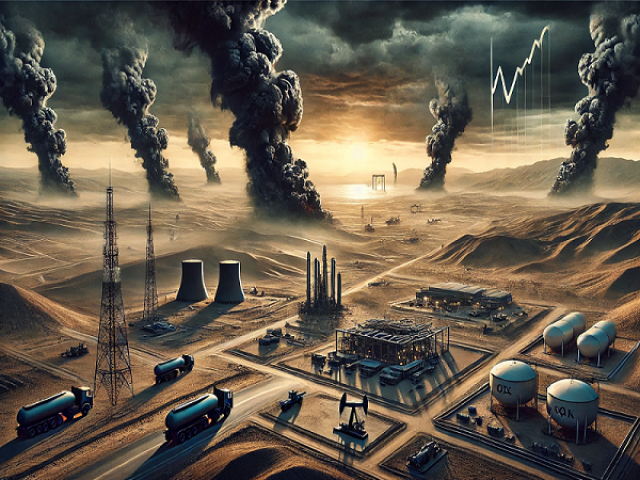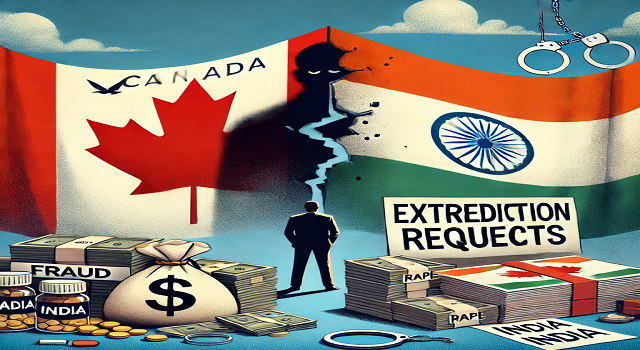Rising Tensions In The Middle East: The Growing Conflict Between Israel And Iran And Its Global Impact"
- Posted on 27-10-2024
- News
- By Saumy Verma
- 231 Views
The longstanding tension between Israel and Iran has now reached a dangerous new depth, recently taking a violent turn. Following an Iranian attack on October 1st, Israel has launched a powerful counterstrike, targeting key Iranian military sites. Israeli Prime Minister Benjamin Netanyahu, alongside his officials, assessed the situation to ensure that their forces carried out precise and effective action. This conflict is increasingly causing strain not only between these two nations but across the entire Middle East, with experts warning that the situation could have global implications.

Escalation of Tension: Where Did It Begin?
Israel and Iran have been locked in a political and military struggle for years. The expansion of Iran’s nuclear program and its aggressive stance against Israel are major drivers of this tension. Additionally, several Iranian proxy organizations are actively involved in attacks against Israel. Groups like Hezbollah, Hamas, and other Iran-backed factions have carried out strikes on Israel, further intensifying the situation.
On October 1st, Iran attacked Israel, prompting Israeli officials to hint at a response. Twenty-six days later, on October 26th, the Israeli military conducted precision strikes on Iranian military bases. Israeli officials claim that the operation specifically targeted military facilities to avoid civilian impact. According to the Israeli army, this strike was a measure of self-defense.
Israeli Military Strategy and Warnings
The Israeli army has stated that it is actively engaged on seven different fronts against Iran and its proxies. In this attack, the Israeli forces emphasized that they targeted only Iranian military facilities with precision and caution. According to them, Iran and its allied organizations have launched numerous attacks against Israel from multiple fronts, posing a direct threat to Israeli security. The Israeli military has made it clear that they will take action against any perceived threat, with no compromises on national security.
Experts suggest that the stance of the Israeli military highlights its determination to protect its regional interests. The purpose of such actions is to send a message that Israel’s security will not be compromised, and it will take all necessary steps to safeguard its citizens. Following this strike, Israel issued another statement that this action is only the beginning, and harsher measures may follow if necessary.
America’s Role and Reactions
Prior to the strike, Israel informed the United States about the impending attack. However, this time, the U.S. has denied any involvement in the assault. According to CNN, a senior Biden administration official stated that while the U.S. is not a part of the attack, Israel has the right to self-defense. This statement reflects the strong strategic partnership between the U.S. and Israel, as the U.S. has frequently supported Israel against Iran.
In an incident last month, Hezbollah’s chief Hassan Nasrallah was killed, and Israel had not informed the U.S. beforehand. This incident caused some dissatisfaction in the U.S., but this time, Israel has attempted to maintain relations by informing the U.S. in advance about the attack.
The U.S. has consistently cautioned Israel against attacking Iran’s oil and nuclear facilities, as it could heighten tensions in the Gulf region. The U.S. has reiterated that such actions could lead to a regional war, disrupting global oil supplies. An attack on oil reserves could result in a surge in oil prices, impacting global markets.
Expert Opinions and Potential Risks
Experts believe that the conflict between Israel and Iran poses a significant threat to peace in the Middle East. With multiple conflicts already ongoing in the region, a clash between Israel and Iran could further complicate these situations.
If Iran launches further attacks, experts warn that Israel’s response could be even more severe. In such a case, the conflict would not remain limited to just these two nations but could draw in other Gulf countries as well. This would have a severe impact on regional stability and could also affect global peace and economic stability.
If the conflict continues to escalate, oil prices could spike, presenting a serious challenge for the global economy. This could disrupt oil supplies for various countries, leading to inflation and economic instability.
Challenges Ahead for Israel and Iran
The conflict between Israel and Iran has now reached a point where retreat seems difficult. Israel has made it clear that it will not compromise on its security at any cost. On the other hand, Iran shows no signs of stopping its activities.
If Iran continues to activate its proxy organizations against Israel, this conflict could become even more widespread. Meanwhile, Israel must ensure the safety of its citizens and military bases through appropriate strategy. If both countries pursue dialogue or diplomacy, this confrontation could potentially be avoided, though this seems unlikely for now.
Conclusion
The ongoing conflict between Israel and Iran once again highlights how the lack of stability in this region can become a global issue. Israel has exercised its right to self-defense, but the repercussions of such a confrontation could be severe. The U.S. and other global powers will need to closely monitor the situation and work to prevent further escalation. If this conflict intensifies, it could pose concerns not only for the Gulf region but for the entire world.
This kind of tension in the Middle East could redefine international relations, and new alliances may emerge as a result. In the coming days, it will be interesting to see how the countries involved navigate the conflict and what strategies they adopt to seek peace.



